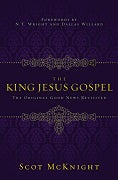Evangelicalism is known for at least two words: gospel and (personal) salvation. Behind the word gospel is the Greek word euangelion and evangel, from which words we get evangelicalism and evangelism. Behind the second word salvation is the Greek word soteria.
I want now to make a stinging accusation. In my book The King Jesus Gospel I will contend firmly that we evangelicals (as a whole) are not really “evangelical” in the sense of the apostolic gospel, but instead we are soterians.
Here’s why I say we are more soterian than evangelical: we evangelicals (mistakenly) equate the word gospel with the word salvation. Hence, we are really “salvationists.” When we evangelicals see the word gospel, our instinct is to think (personal) “salvation.” We are wired this way. But these two words don’t mean the same thing, and my book will do its best to show the differences.
The irony here is obvious: the term we use to define ourselves (gospel/euangelion) does not define us, while the word that does define us (soteria or “salvation”) we do not use to describe ourselves. We ought to be called soterians (the saved ones) instead of evangelicals.
My plea is that we go back to the New Testament to discover all over again what the Jesus gospel is and that by embracing it we become true evangelicals. My prayer for the book is that it will revive a generation of evangelicals to become true evangelicals instead of just soterians.
What has happened is that we have created a “salvation culture” and mistakenly assumed it is a “gospel culture.”
A Salvation Culture
Our emphasis on the call to personal faith has created a “salvation culture,” a culture that focuses on and measures people on the basis of whether they can witness to an experience of personal salvation. Our salvation culture tends toward asking one double-barreled question: “Who is in and who is out?” Or more personally, “Are you in or out?” The evangelical culture focuses on the experience of personal salvation as the decisive factor for creating that culture. Perhaps the most important thing I can say about what my book will argue boils down to these points:
- A salvation culture and a gospel culture are not the same.
- In thinking our salvation culture is identical to a gospel culture, we betray a profound lack of awareness of what gospel means and what a gospel culture might mean for our world today.
- We are in need of going back to the Bible to discover the gospel culture all over again and making that gospel culture the center of the church.
Evangelicalism seeks to move The Members into The Decided batch with their emphasis on personal decision and personal salvation. But evangelicals struggle with moving The Decided to become the The Discipled because they have created a (sometimes smug) salvation culture in which the obsession is making the right decision so we can cross the threshold from the unsaved to the saved (The Decided).
A gospel culture, though, encompasses it all and leads The Members into The Discipled because it equates the former with the latter.
Salvation cultures have struggled, are struggling, and will continue to struggle to get The Members or The Decided into the third category: The Discipled. My contention is that we have to create a gospel culture if we want The Members to be The Discipled.
The apostolic gospel, because it was a gospel culture gospel and not a salvation culture gospel, did not have this struggle. This struggle is our own making. The salvation culture gospel will always create the problem of discipleship.
In The King Jesus Gospel we want to show that the gospel of Jesus and that of the apostles, both of which created a gospel culture and not simply a salvation culture, was a gospel that carried within it the power, the capacity, and the requirement to summon people who wanted to be “in” to be The Discipled.
In other words, it swallowed up a salvation culture into a gospel culture.
— Scot McKnight, adapted from his book The King Jesus Gospel: The Original Good News Revisited, now available in softcover for the first time.
How to Use This Book
What if everything you’ve heard about leadership is wrong? Unfortunately, secular models of leadership rooted in pragmatic success dominate Christian leadership; this makes our work impersonal and exploitative. Bill Hull’s book will help you learn to embrace a different way of leading. You will discover how to change the sources of your behavior: your motives and reasons for being a Christian leader. Transformation will follow–in you, and in those you lead and serve.

